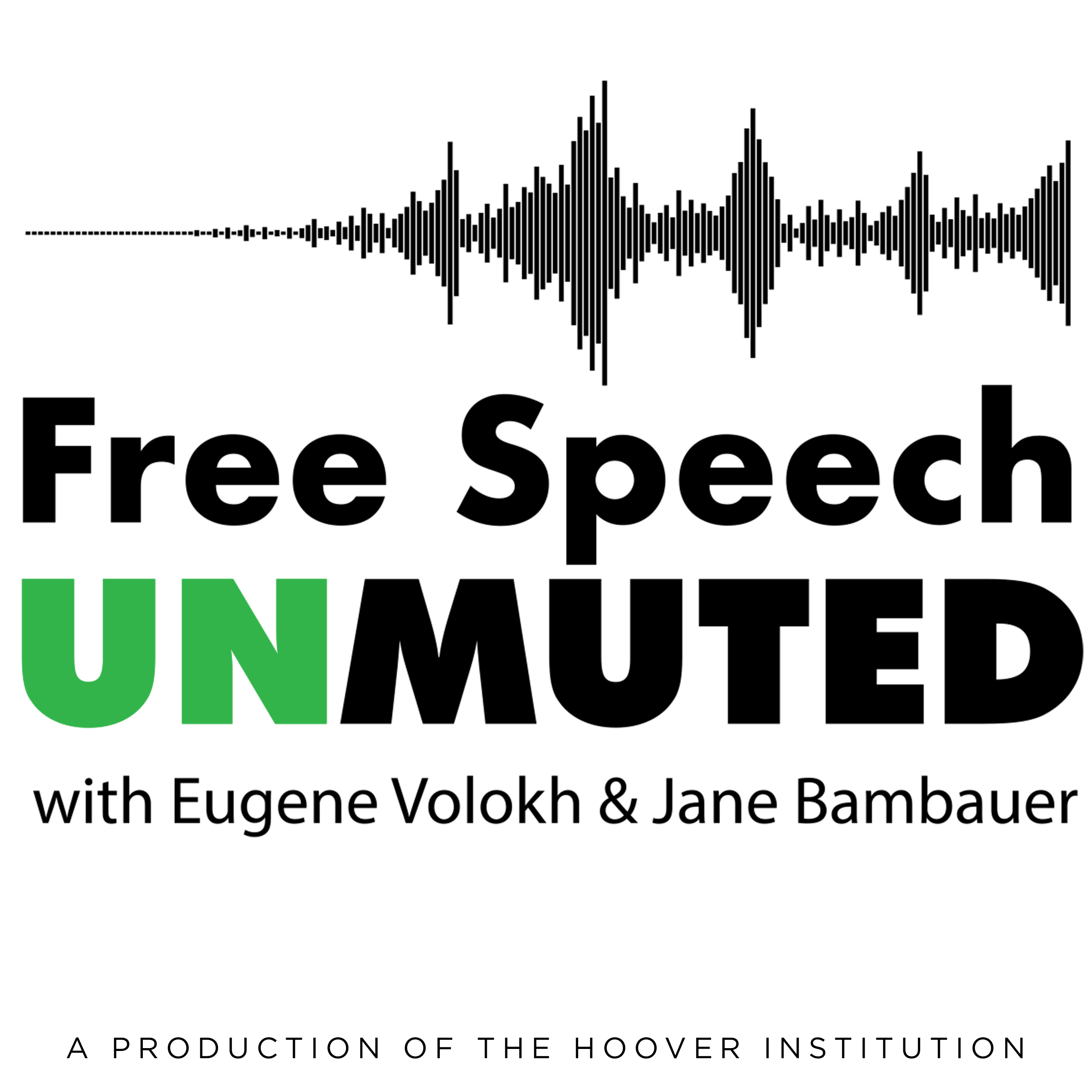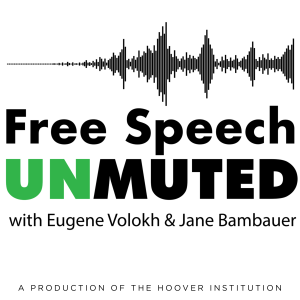
17.8K
Downloads
31
Episodes
Hoover Institution Senior Fellow Eugene Volokh is one of the country’s foremost experts on the 1st Amendment and legal issues surrounding free speech. Jane Bambauer is a distinguished professor of law and journalism at the University of Florida. On Free Speech Unmuted, Volokh and Bambauer unpack and analyze the current issues and controversies concerning the First Amendment, censorship, the press, social media, and the proverbial town square. They’ll also explain in plain English the often confusing legalese around these issues and explain how the courts and government agencies interpret the Constitution and new laws being written, passed, and decided will affect their everyday lives.
Episodes

Tuesday Jul 01, 2025
Tuesday Jul 01, 2025
Eugene Volokh and Jane Bambauer discuss the Court’s June 27 decision in Free Speech Coalition v. Paxton, which upheld a state law that required pornography sites to “use reasonable age verification methods ... to verify” that their users are adults.
Recorded on July 1, 2025.
Subscribe for the latest on free speech, censorship, social media, AI and the evolving role of the First Amendment in today’s proverbial town square.

Monday Jun 09, 2025
Monday Jun 09, 2025
Eugene Volokh and Jane Bambauer discuss the First Amendment rules pertaining to public school students. The occasion: The Supreme Court just declined to consider a federal appeals court case that led a public school to punish a student for wearing a T-shirt saying “There Are Only Two Genders.” Did the lower court get that right?
Recorded on June 3, 2025.

Friday May 09, 2025
Friday May 09, 2025
A mother sues Character.AI, claiming that a conversation between her teenage son and a Character.AI chatbot led him to commit suicide. A conservative activist sues Meta, claiming that its AI-generated false accusations about him. Jane Bambauer and Eugene Volokh analyze these cases, and more broadly, discuss lawsuits against AI companies, and possible First Amendment defenses to those lawsuits.
Recorded on May 6, 2025.

Tuesday Apr 22, 2025
Tuesday Apr 22, 2025
Eugene Volokh and Jane Bambauer discuss the Administration’s freezing of grants to Harvard, and Harvard’s lawsuit challenging the freeze.
The Trump Administration has announced that it was freezing grants to Harvard, and demanding that Harvard change many of its policies and practices in order to get back in the Administration’s good graces. President Trump has also suggested that Harvard might lose its tax-exempt status for “pushing political, ideological, and terrorist inspired/supporting ‘Sickness.’” Would such a cutoff of funding or tax exemption benefits violate the First Amendment? Jane and Eugene dig deep into that.
Recorded on April 22, 2025.

Thursday Apr 03, 2025
Trump’s War on Big Law | Eugene Volokh and Jane Bambauer | Hoover Institution
Thursday Apr 03, 2025
Thursday Apr 03, 2025
Eugene Volokh and Jane Bambauer discuss President Trump’s Executive Orders that target major law firms (such as WilmerHale and Jenner & Block).
The orders target the firms for retaliation based largely on their past support of various left-wing legal causes. Do those Orders violate the firms’ (and their clients’) Free Speech Clause or Petition Clause rights? Might they also violate the Fifth Amendment’s Due Process Clause (in civil cases) and the Sixth Amendment right to counsel (in criminal cases)?
Recorded on March 31, 2025.

Thursday Mar 13, 2025
Thursday Mar 13, 2025
Eugene Volokh and Jane Bambauer discuss the First Amendment and immigration law.
Recorded on March 12, 2025.

Monday Feb 24, 2025
Monday Feb 24, 2025
Does the Free Press Clause provide extra rights to the institutional press, or instead protect all speakers’ equal rights to use the printing press and its technological heirs? Eugene Volokh and Jane Bambauer discuss this and more with legendary First Amendment litigator Floyd Abrams.
Download the 2025 Stanford Emerging Technology Review here: https://stanford.io/4bilFg0
Recorded on February 21, 2025.

Thursday Jan 30, 2025
Thursday Jan 30, 2025
The Constitution generally covers only government action; if a private university expels students for their speech, or a private shopping mall forbids leafletting, or a private employer fires an employee for backing some candidate, that doesn’t violate the First Amendment. But state laws in roughly half the states do limit some such private restrictions on speech and political activity, especially ones imposed by private employers, much as federal law limits private employers’ restriction on their employees’ religious activity. Should there be more such laws? Fewer? Eugene Volokh and Jane Bambauer talk about this, and more.
Recorded on January 28, 2025.

Free Speech Unmuted
Freedom to talk about anything.
